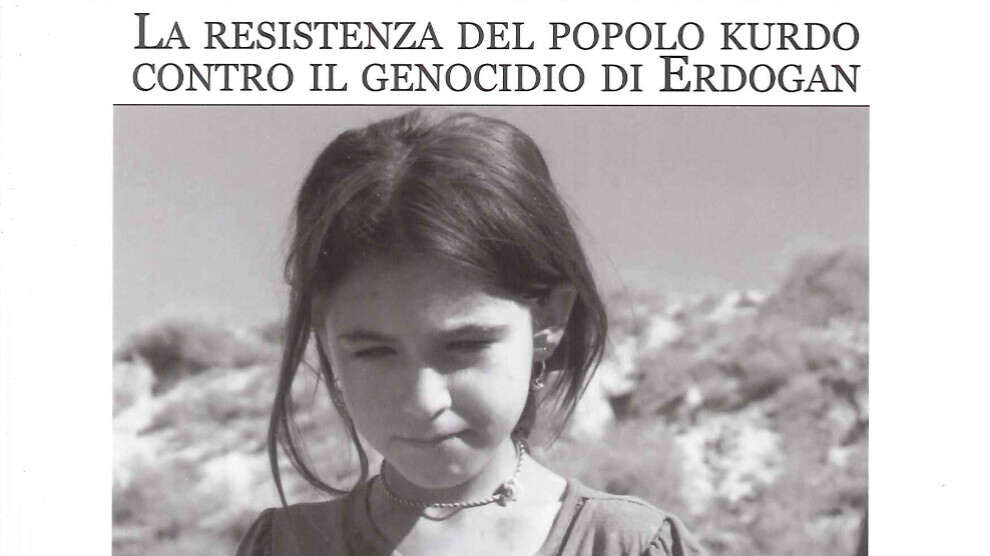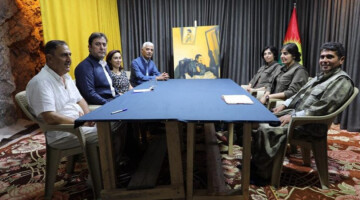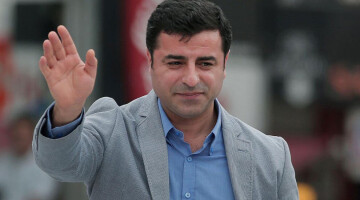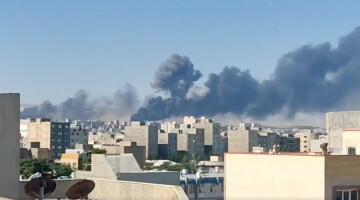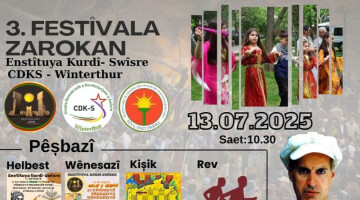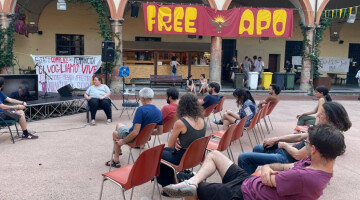Italian journalist and writer Laura Schrader, who is a member of the 'Committee for the Freedom of Abdullah Öcalan', wrote the book "Berxwedan" inspired by the peace initiatives developed by the Kurdish People's Leader in Imrali Prison under conditions of captivity and the resistance that developed in Kurdistan in the light of his philosophy and ideas. The book was published by Edizione Punto Rosso publishing house, which had previously published Abdullah Öcalan's books.
Laura Schrader, author of I Fuochi del Kurdistan (The Fire of Kurdistan), Civilta e Verita (Civilization and Truth), Berxwedan (La Resistenze del Popolo Kurdo Contro il Genocidio di Erdoğan), deals with the resistance of the Kurdish people against the genocide of Erdoğan.
In Berxwedan, author Laura Schrader includes the writings of Abdullah Öcalan's nephew Ayney Öcalan and important accounts of the trial of the Kurdish leader in 1999. The author analyzes the resistance that developed on the basis of Abdullah Öcalan's ideas and philosophy against the total war of extermination waged by the Turkish state against the Kurdish people.
The book describes Abdullah Öcalan's struggle for peace, the politics he put forward for peace in Imrali Prison, his determined attitude and resistance against all the tendencies of the state, and the stages of his struggle. The author analyzes Abdullah Öcalan's leadership stance in all its details and focuses on the isolation of millions of Kurds in the person of Abdullah Öcalan.
The author tells of the politics developed by Kurdish People's Leader Abdullah Öcalan and the uprisings of the Kurdish people, the legendary war of the guerrilla and the visibility of Kurdish women in both war and social life with concrete events and documents.
Schrader discusses Kurdish People's Leader Abdullah Öcalan's search for peace, starting from the general ceasefire he declared in 1993, and reflects the Peace Groups sent to Turkey in the 1990s, the Oslo Meetings, and the message published at the 2013 Newroz in the book with all its details. Describing Öcalan’s performance and predictions for peace in detail, the author conveys to readers all aspects of the process until Turkish President Erdoğan's declaration of war in 2015.
The author also describes in detail the revolutionary adventure rising in Rojava in line with Öcalan’s ideology, the Kobane resistance, the Shengal resistance, and explains the importance of Öcalan’s ideology and philosophy for the world against the ISIS mentality. The author, who also examines the partnership and ideological ties of Erdoğan and his party with ISIS, presents with documents how the Turkish state itself launched a war against Kurdish gains in the field after the defeat of ISIS by the fighters of Leader Öcalan. She discusses in detail the behind-the-scenes of the Turkish state's attacks on Afrin, Serêkanîye, Girê Spî and Kobanê under the leadership of Erdoğan.
Schrader covers extensively the Turkish state's destruction of Sur, Cizre, Nusaybin, Şırnak and Yüksekova, the portraits of Peace Mothers, murdered women such as Sakine Cansız, Fidan Doğan and Hevrin Khalef, and the portraits of Kurdish politicians held captive, such as Selahattin Demirtaş.
The extraordinary story of the Kurdish people's resistance against the "genocide in the shadow of NATO", inspired by Öcalan, is reflected in the book in all its aspects.
The author explains with extensive examples how Leader Öcalan, who has been isolated for a long and subjected to continuous isolation, gives hope to the whole world with his ideas and philosophy, and states that as the creator of the ‘Jin, Jiyan, Azadî’ (Woman, Life, Freedom) philosophy, his thoughts have taken root in the world.
Dedicated to the campaign for Abdullah Öcalan's freedom, the book "Berxwedan" deals with the truths unknown to Italian politics and public opinion with all its documents.

